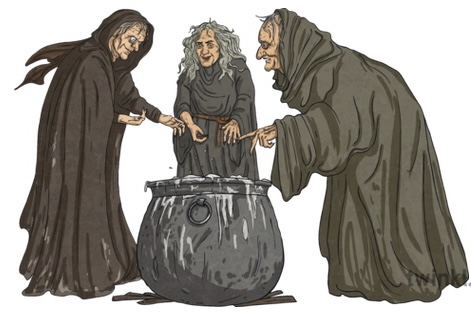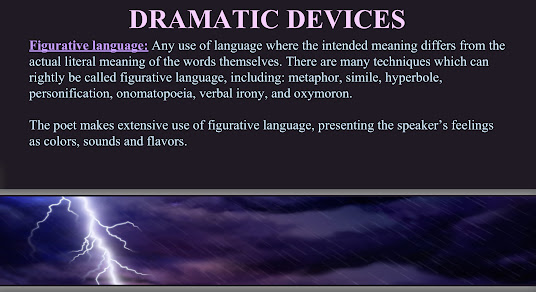Aim: How has Macbeth’s interactions with multiple characters, coupled with various or conflicting motivations, advanced the plot or developed the theme? (Day 1)
First, we started off class with the Do Now (whole-class discussion):

1. Describe a time when you or someone you know had some supernatural telling i.e., tarot cards, psychics, etc., and you/they believed what was said. Explain why you/they believed it.
Kelly said that her friend used to do palm readings in 5th grade. Ms. Peterson shared her own little story on how she was super skeptical and went to a psychic when she was 19. And the psychic told her how her mother who had 2 other siblings both younger and the middle one had passed. She described that she was shocked because there was no way that the psychic could have known all that information. I personally do believe in these tarot cards and psychics because sometimes they are too specific to not be true/the psychic or reading said something way too accurate/specific to not be applied to you.
2. How do most people react to predictions about their future?
A lot of people might become worried about the predictions and some might even try to change the prediction they might receive. Some doubt it because the future is changeable, variable. Joel shared how people will most likely be half and half, where some will believe it and others will not. For example, they might believe that the future is not set in stone and cannot be changed so these predictions are most likely false. Others knowing this came from a psychic might believe and go berserk start trying to prevent the event if the reading isn’t necessarily good.
3. What may happen to the person if some of the things seem to come true?
Josh shared how a lot of people might see it as a coincidence or that it just so happened, doesn’t mean it had anything to do with the psychic reading/tarot reads. It was just a stroke of luck that the event occurred. Edward shared how it really depends on the person who experiences this event because some might be spiritual and actually believe that some higher power has some influence on their lives and controls their future. Oftentimes, when a person has something going on in their lives and a supernatural message is given to them and it so happens the events play out like what was uttered in the message, they will start to believe/think that there is some validity in this. It could also cause a person to go mad trying to find out more.
Next, we read/acted: Macbeth — Act I, iii (https://youtu.be/XEYzz3xlafo?t=277 —> Reading of Scene 3)
Macbeth — Act I, iv (https://youtu.be/XEYzz3xlafo?t=795 —> Reading of Scene 4)
Characters in Macbeth — Act I, iii
The Narrator
Three Witches
Macbeth
Banquo
Ross
Angus
Characters in Macbeth — Act I, iv
The Narrator
Macbeth
Banquo
Duncan
Malcolm
Class Discussion: The “3” Witches 
At the beginning of the book, we see the witches deciding on a day to meet up again and now we see that they chose when it was thundering to meet up again. The witches are basically doing a show and tell, where they share what they’ve been up to. The first witch was killing swines, or pigs. The second witch found a sailor’s wife eating chestnuts and when she asked the wife for some chestnuts, the sailor’s wife chased her away. In the Elizabethan era, women often didn’t have many rights, so they were often dependent on their husbands. Because of this, the second witch decides to get even with her by going after her husband. The witch is going to sabotage the sailor’s ship, The Tiger. The witches are going to make it so that the ship never reaches any of the ports, so they can’t replenish their drinking supply of water. They can’t touch the ship itself, but they are going to make the journey a living hell with all the winds they’re going to launch. The third witch just found a pilot’s thumb, nothing else of the body. This all leads to a witches’ brew (they incorporate the pilot’s thumb into the brew) where Macbeth is the target.
How are The Witches’ powers limited?
We discussed how the witches can control natural elements, like the wind. Summer said how they can influence certain events, but they can’t directly control them. For example, they can’t destroy the ship or make it vanish, but they can make sure it will be a terrible, terrible journey. With the winds they're going to use, the ship will rock and rock to the point where the sailors are going to be super sick.
After we had our class discussion on the “3” Witches, we introduced some dramatic devices to better understand the script.

NOTE: Aside is where a character is voicing a comment spoken only to the audience. An example of a soliloquy is in Act I, Scene iii, where Macbeth is voicing his inner thoughts.
Next, we discussed the teamwork questions and then had a class discussion.

How do Macbeth and Banquo react to the witches' prophecies?
Our team: Macbeth and Banquo doubt the witches’ prophecies. However, Macbeth starts to get very excited by the idea of becoming king.
Class: Macbeth is excited about the prophecy, meanwhile, Banquo is skeptical about it. Macbeth receives his prophecy and Banquo is confused and asks about his own because he didn’t receive one yet. Banquo is basically saying if you can give my friend here such a prediction of the future, where is mine? If you’re so powerful and almighty, give my prophecy as well.
What does the figurative language used by Banquo in the line “instruments of darkness” imply?
Our team: We had no idea what this line meant. I honestly thought that he meant there was darkness inside Macbeth and that Macbeth was eventually going to betray the king.
Class: Banquo using the words “instruments of darkness” lets us know that he believes that the witches come from hell. They are vessels that do evil’s bidding.
What is Banquo’s warning to Macbeth in lines 132-139?
Our team: We thought that Banquo was warning Macbeth to be wary of the witches’ prophecies. He shouldn’t get too caught up in the fantasy of becoming king.
Class: Banquo is warning Macbeth that there is a bit of truth in every lie. He is saying that the biggest deception can start with a truth just to betray you at the very end when it means the very most, to lead you down the wrong path. He believes that the witches come from hell with the words “instruments of darkness” and that they do the devil’s bidding, so they will tell you a bit of truth to win you over to get you to trust them only for them to betray you in the end.
Macbeth states: “Let us speak our free hearts to each other” to Banquo. What is he promising and why is that significant?
Our team: Macbeth and Banquo promise to be honest with each other.
Class: Macbeth is saying to Banquo to look over the events of today and to reflect upon them honestly. Macbeth is promising to be honest, but based on previous events in the book, Macbeth hasn’t been completely honest, so he will most likely not be fully honest.
TODAY’S LESSON TAKES PLACE OVER THE COURSE OF TWO DAYS. THIS MARKS THE END OF THE FIRST DAY.
Reflection:
In this lesson, many techniques were used to help us better understand what Shakespeare was trying to convey through his writing. For instance, when different roles were read aloud by different students, it really helped me engage with the characters and overall story. Today, we really focused on Scenes 3 and 4. Because of the way we read the scenes, it actually helped me retain a ton of information and allowed me to read between the lines of the play, for example, what Banquo was trying to say to Macbeth. Banquo was trying to warn Macbeth about the witches’ prophecy for him. After the reading of the scenes, we were given a great deal of time to try to understand the text with our group mates and this actually helped me a lot because they brought up different points that I never thought of. It also taught how to better decipher a text and to cut through the thick language and get straight to the meat of the topic. For example, when the second witch was speaking about getting revenge on the sailor’s wife, I had no idea what was happening until our team and class discussed it together. I finally realized that Shakespeare was describing what the witches were planning to do to the ship of the sailor. As a class, when we discussed different scenes, it honestly helped so much because the word choice was very confusing for me and looking back at some of the points the class made, I understood what was happening in the play and fixed all of my misunderstandings. This will definitely be useful in the future as we continue to read more Shakespeare and Macbeth, but will also be useful in classes such as World History. Some of the texts in World History originate from the same period or have the same confusing word choice that will become easier for me to understand because of these lessons in English. This will also be helpful in general because this will not be the last time I see Shakespeare or confusing, difficult wording. (For example, confusing, difficult wording on legal documents.)

No comments:
Post a Comment